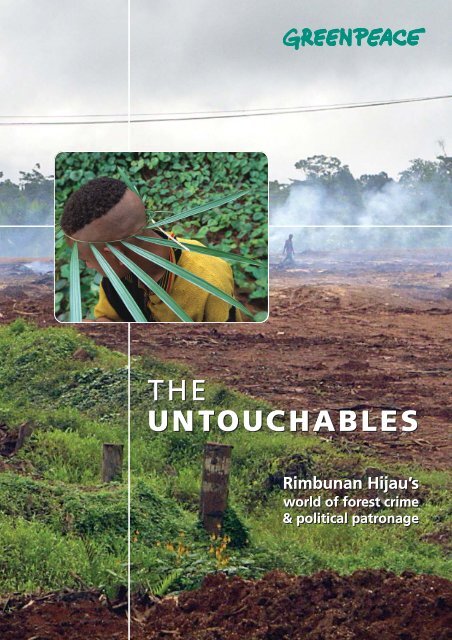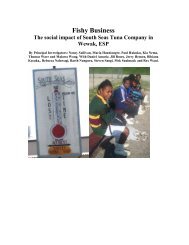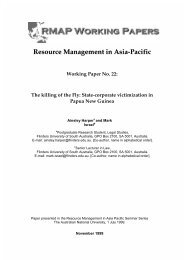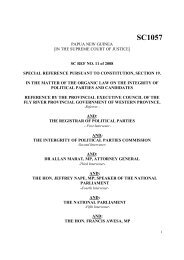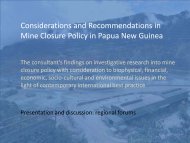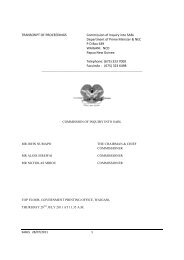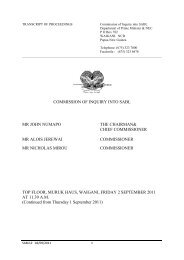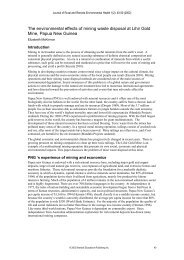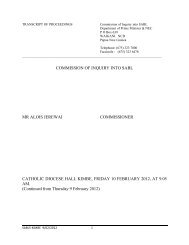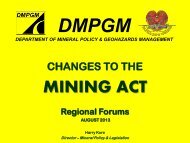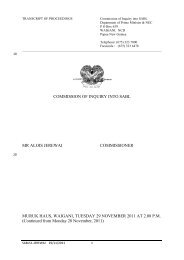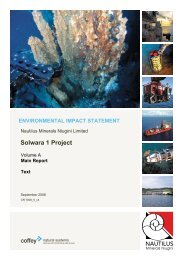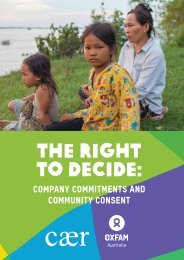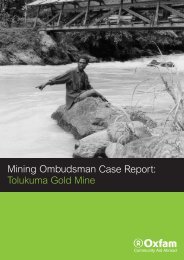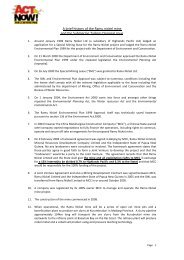Rimbunan Hijau's world of forest crime - Greenpeace
Rimbunan Hijau's world of forest crime - Greenpeace
Rimbunan Hijau's world of forest crime - Greenpeace
Create successful ePaper yourself
Turn your PDF publications into a flip-book with our unique Google optimized e-Paper software.
THE<br />
UNTOUCHABLES<br />
<strong>Rimbunan</strong> Hijau’s<br />
<strong>world</strong> <strong>of</strong> <strong>forest</strong> <strong>crime</strong><br />
& political patronage
EXECUTIVE SUMMARY<br />
The global trade in illegal and destructively<br />
logged timber is now out <strong>of</strong> control.<br />
Unlawful access to <strong>forest</strong> resources,<br />
environmental damage and <strong>forest</strong> destruction,<br />
human rights abuses and social dislocation <strong>of</strong> <strong>forest</strong>dwelling<br />
peoples in some <strong>of</strong> the poorest areas <strong>of</strong> the<br />
<strong>world</strong>, are being fuelled by those who buy timber<br />
and timber products from these illegal sources.<br />
One major player in this field is <strong>Rimbunan</strong> Hijau.<br />
<strong>Rimbunan</strong> Hijau is a global conglomerate <strong>of</strong><br />
companies controlled by the Tiong family from<br />
Sarawak in Malaysia. Initially built as a timber<br />
empire, the company now has extensive interests in<br />
logging, timber processing, publishing, property<br />
investment, new technology and travel.<br />
<strong>Rimbunan</strong> Hijau dominates the logging industry<br />
in Papua New Guinea and is a powerful industry<br />
player in Malaysia and Equatorial Guinea. It also has<br />
significant <strong>forest</strong>ry interests in Gabon, Indonesia,<br />
Vanuatu, New Zealand, and Russia. 1<br />
In these countries, the operations <strong>of</strong> <strong>Rimbunan</strong><br />
Hijau are <strong>of</strong>ten characterised by a disregard for the<br />
law with documented illegalities in many aspects <strong>of</strong><br />
their operations.<br />
Illegal access to <strong>forest</strong> resources, environmental<br />
damage and human rights abuses are repeated<br />
complaints. But the company seems impervious to<br />
criticism and appears to be protected by an<br />
extensive and well-established network <strong>of</strong> political<br />
patronage and media control.<br />
Timber produced by <strong>Rimbunan</strong> Hijau is traded<br />
across the globe with little concern for the<br />
environmental damage, misery and suffering<br />
caused in producer countries.<br />
<strong>Rimbunan</strong> Hijau’s illegal timber and timber<br />
products are being traded across-the-counter in<br />
Asia, America, Europe, Japan, Australia and New<br />
Zealand.<br />
Kuwene Nakeye, a landowner from the Haya clan, Kosuo tribe in a reserve she protected from logging. Kuwene is seen here with her nephew Alex Ubiye.They<br />
have worked together to protect their land from logging by <strong>Rimbunan</strong> Hijau.© Scheltema/<strong>Greenpeace</strong><br />
THIS REPORT<br />
• Examines the extent and impact <strong>of</strong> <strong>Rimbunan</strong> Hijau’s (RH) timber operations in five key countries;<br />
• Highlights the environmental damage, human rights abuses and social suffering caused by RH;<br />
• Reveals some <strong>of</strong> the networks <strong>of</strong> political patronage that protect RH;<br />
• Details the global trade in illegal timber from RH logging operations;<br />
• Suggests simple and effective solutions to <strong>forest</strong> <strong>crime</strong>s and to mitigate the activities <strong>of</strong> companies like RH.<br />
2 THE UNTOUCHABLES<br />
<strong>Rimbunan</strong> Hijau’s <strong>world</strong> <strong>of</strong> <strong>forest</strong> <strong>crime</strong> & political patronage
THE GLOBAL FOREST CRISIS<br />
Ancient <strong>forest</strong>s are fundamental to life on Earth.<br />
They provide a home and vital sustenance to<br />
millions <strong>of</strong> people. They provide a habitat for<br />
innumerable species <strong>of</strong> plants and animals. And<br />
they perform vital ecological functions.<br />
Ancient <strong>forest</strong>s are the place that millions <strong>of</strong><br />
indigenous peoples call home. Some <strong>of</strong> these<br />
peoples constitute the poorest and most<br />
disadvantaged <strong>of</strong> all <strong>world</strong> citizens. They suffer<br />
human rights abuses, great poverty, disease and<br />
other social problems as <strong>forest</strong> areas are harvested,<br />
with little or no consideration for their plight or<br />
livelihoods.<br />
“...landowners were forced<br />
to sign papers with a<br />
barrel <strong>of</strong> a gun at their<br />
back. In the presence <strong>of</strong><br />
police and company<br />
<strong>of</strong>ficials, without proper<br />
legal advice, with guns<br />
pointed at them.”<br />
Annie Kajir, Human Rights Lawyer, Port<br />
Moresby, Papua New Guinea. 3<br />
Now, just 20<br />
percent <strong>of</strong> the Earth’s<br />
original <strong>forest</strong> cover<br />
remains as large intact<br />
areas; with more than<br />
a third <strong>of</strong> these under<br />
threat. Industrial-scale<br />
logging poses the<br />
single largest menace<br />
to the <strong>forest</strong>s’<br />
survival. 2<br />
Across the globe,<br />
trans-national<br />
corporations continue<br />
to operate<br />
destructively, and <strong>of</strong>ten outside <strong>of</strong> the law, as they<br />
harvest the <strong>world</strong>’s last remaining accessible <strong>forest</strong><br />
resources.<br />
Malaysian logging company, <strong>Rimbunan</strong> Hijau<br />
(RH) is one such corporation.<br />
Logging destruction is fuelled by a complacent<br />
international marketplace. In addition, consuming<br />
nations <strong>world</strong>wide, eager to fulfil a relentless<br />
demand for wood and paper, turn a blind eye to<br />
“Some 350 million <strong>of</strong> the poorest people on Earth are<br />
entirely dependent on <strong>forest</strong>s for their survival”<br />
World Commission on Forests and Sustainable Development 1999. 4<br />
the social, environmental and legal problems that<br />
characterise the logging operations <strong>of</strong> companies<br />
like <strong>Rimbunan</strong> Hijau.<br />
The actions <strong>of</strong> <strong>forest</strong> plunderers amount to far<br />
more than just a huge ecological disaster.<br />
They have severe impacts on local people and on<br />
the national economies <strong>of</strong> some <strong>of</strong> the Least<br />
Developed Countries (LDCs) in the <strong>world</strong>.<br />
KEY POINTS<br />
1. Much <strong>of</strong> the global trade in timber and timber<br />
products is unlawful.<br />
2. Destructively and illegally extracted timber<br />
exacts a ruinous toll on <strong>forest</strong> eco-systems and<br />
on the lives <strong>of</strong> <strong>forest</strong>-dwelling peoples. It cheats<br />
developing countries <strong>of</strong> revenue and resources<br />
necessary for survival and national<br />
development.<br />
3. Companies like <strong>Rimbunan</strong> Hijau operate across<br />
national boundaries and are a key participant in<br />
the illegal harvesting <strong>of</strong> timber.<br />
4. Such companies operate with impunity and<br />
cultivate a network <strong>of</strong> political patronage that<br />
breeds <strong>of</strong>f political systems that are under<br />
immense stress in Southern nations.<br />
5. Only measures at both the producer level (where<br />
<strong>forest</strong>s must be protected from illegal and<br />
destructive logging) and at the consumer level<br />
(where illegal timber and timber products must<br />
be identified and banned) will<br />
effectively address the problem.<br />
6. International and bilateral<br />
political processes, such as the<br />
Convention for Biological<br />
Diversity (CBD), are an<br />
opportunity for governments to<br />
fund the protection <strong>of</strong> ancient<br />
<strong>forest</strong>s and put in place strict<br />
international guidelines and<br />
programmes to achieve the<br />
“significant reduction in<br />
biodiversity loss by 2010”, agreed<br />
to at the Johannesburg Earth<br />
Summit in 2002.<br />
Pepsy Diabe, Kamala clan, Kusuo<br />
Tribe stands amidst devastation<br />
<strong>of</strong> recent logging, Wawoi Guavi,<br />
Papua New Guinea. ©<br />
Scheltema/<strong>Greenpeace</strong><br />
THE UNTOUCHABLES 3<br />
<strong>Rimbunan</strong> Hijau’s <strong>world</strong> <strong>of</strong> <strong>forest</strong> <strong>crime</strong> & political patronage
WHO IS RIMBUNAN HIJAU?<br />
<strong>Rimbunan</strong> Hijau is a conglomeration <strong>of</strong> many<br />
hundreds <strong>of</strong> companies spread across three<br />
continents all owned and controlled by the Tiong<br />
family but which sometimes have no other <strong>of</strong>ficial<br />
connection.<br />
<strong>Rimbunan</strong> Hijau has business interests in Australia,<br />
British Guyana, China, Equatorial Guinea, Hong<br />
Kong, Indonesia, Gabon, Malaysia, Aotearoa (New<br />
Zealand), Papua New Guinea, Russia, Singapore,<br />
Vanuatu and an estimated annual turnover in excess<br />
<strong>of</strong> US$1 billion according to the Malaysia-China<br />
Business Council. 5<br />
The Tiong family has built <strong>Rimbunan</strong> Hijau into an<br />
immense corporate empire that started out as a<br />
logging company but which now extends to include<br />
interests in timber processing, agriculture (cocoa and<br />
oil palm), aquaculture, insurance, banking,<br />
publishing 6 , optical fibres, information technology,<br />
shipping, retailing, travel, real estate and property<br />
development, mineral and mining development and<br />
print media.<br />
The business dealings and corporate structure <strong>of</strong><br />
<strong>Rimbunan</strong> Hijau as a company are not open or<br />
transparent, particularly as regards its many<br />
corporate shareholdings and takeovers.<br />
In Papua New Guinea for example, <strong>Greenpeace</strong><br />
research has identified over 60 separate companies<br />
as being owned or politically controlled by the Tiong<br />
family — but only a small minority are openly<br />
acknowledged as being a part <strong>of</strong> the <strong>Rimbunan</strong><br />
Hijau group. The ownership and control <strong>of</strong> the rest is<br />
obscured by undisclosed buyouts, proxy directors and<br />
shareholders, outdated company records, foreign<br />
ownership and widespread use <strong>of</strong> tax havens. 7<br />
MALAYSIAN MULTINATIONAL<br />
LOGGING COMPANIES<br />
Multinational Malaysian logging companies got<br />
their start in Malaysia’s rain<strong>forest</strong>s.<br />
Malaysian logging companies are <strong>of</strong>ten registered<br />
as family-owned private limited companies, allowing<br />
them to operate secretly as they are not publicly<br />
listed corporations.<br />
Many <strong>of</strong> these companies have political<br />
connections that helped them secure large areas <strong>of</strong><br />
<strong>forest</strong>.<br />
Within a couple <strong>of</strong> decades they left large areas <strong>of</strong><br />
Malaysia de<strong>forest</strong>ed.<br />
Less than 15 percent <strong>of</strong><br />
Malaysia’s <strong>forest</strong>s today<br />
remain intact 8 .<br />
After years <strong>of</strong><br />
destructive logging<br />
practices, the Malaysian<br />
government began to<br />
enact stricter regulations<br />
to attempt to save what<br />
little rain<strong>forest</strong> was left<br />
in the country. This<br />
caused the Malaysian<br />
companies to look<br />
elsewhere for lumber —<br />
a path which led them<br />
to Indonesia, Papua New<br />
Guinea and other parts<br />
<strong>of</strong> the <strong>world</strong>.<br />
Equipment at an RH<br />
logging camp in Kandrian,<br />
Papua New Guinea<br />
© Solness/<strong>Greenpeace</strong><br />
"Established in 1975, <strong>Rimbunan</strong> Hijau Group has a<br />
diversified portfolio <strong>of</strong> businesses with estimated annual<br />
turnover exceeding USD 1 billion, with<br />
most items exported. Currently comprising 10,000<br />
employees in Malaysia, the Group continues to expand,<br />
including diversifying overseas. Over the<br />
years, <strong>Rimbunan</strong> Hijau Group has built up extensive<br />
experience in logging, sawmilling, export <strong>of</strong> logs and<br />
sawntimber and downstream processing activities,<br />
ranging from plywood to medium density fibreboard<br />
and particleboard. <strong>Rimbunan</strong> Hijau Group is also a<br />
pioneer in supporting Sarawak's emphasis on<br />
downstream activities. In 1985, it established the state's<br />
first large scale plywood mill under <strong>Rimbunan</strong> Hijau<br />
Plywood Sdn. Bhd. The Group is also the major<br />
shareholder <strong>of</strong> Jaya Tiasa Holdings Bhd and Subur Tiasa<br />
Holdings Bhd, the public listed companies on the Kuala<br />
Lumpur Stock Exchange with market capitalisation <strong>of</strong><br />
about more than RM 2 billion and the largest plywood,<br />
veneer and particleboard producer in<br />
Malaysia.In addition to its operations in Malaysia,<br />
<strong>Rimbunan</strong> Hijau Group has expanded internationally to<br />
Papua New Guinea, New Zealand, Australia, China, Hong<br />
Kong, Singapore, Gabon, Rusia, Congo, Equatorial<br />
Guinea & British Guyana." 9<br />
Malaysian German Chamber <strong>of</strong> Commerce and Industry<br />
4 THE UNTOUCHABLES<br />
<strong>Rimbunan</strong> Hijau’s <strong>world</strong> <strong>of</strong> <strong>forest</strong> <strong>crime</strong> & political patronage
POLITICAL PATRONAGE<br />
<strong>Rimbunan</strong> Hijau enjoys wide political patronage.<br />
In Malaysia the Tiongs have been highly astute in<br />
forming strategic alliances with the Malay political<br />
elite and are personally involved in the SUPP – the<br />
main Chinese Party in Sarawak.<br />
In the early nineties, the brother <strong>of</strong> Sarawak’s<br />
Chief Minister (who controled the allocation <strong>of</strong><br />
logging concessions) was a director <strong>of</strong> a <strong>Rimbunan</strong><br />
Hijau company and a sister <strong>of</strong> the Chief Minister<br />
was a Tiong business partner.<br />
Tiong Hiew King has himself been a State<br />
Senator, a position that was also occupied by one <strong>of</strong><br />
his sons, and Tiong family companies have shared<br />
control <strong>of</strong> their subsidiaries with Provincial Ministers<br />
and party <strong>of</strong>ficials. 10<br />
In Sarawak these ties have resulted in a blurring<br />
<strong>of</strong> the distinction between government and logging<br />
interests and has led “to changes in legislation that<br />
favour corporate activities and which result in the<br />
disregard and repression <strong>of</strong> many actors within civil<br />
society.” 11<br />
In Papua New Guinea <strong>Rimbunan</strong> Hijau is also<br />
closely connected to the political elite.<br />
For example, one recent Deputy Prime Minister<br />
was criticised in an Ombudsman investigation for<br />
unlawfully pressuring the National Forest Board to<br />
favour <strong>Rimbunan</strong> Hijau with an illegal timber<br />
permit extension. 12<br />
The Minister for Justice is Chair <strong>of</strong> a company<br />
that holds a timber permit that it sub-contracts to<br />
<strong>Rimbunan</strong> Hijau. A National Intelligence<br />
Organisation report alleges a provincial Governor<br />
and two Members <strong>of</strong> Parliament were on <strong>Rimbunan</strong><br />
Hijau’s payroll. 13<br />
CORPORATE RESPONSIBILITY<br />
Office <strong>of</strong> the National newspaper,<br />
which is owned by <strong>Rimbunan</strong><br />
Hijau, in Port Moresby, Papua New<br />
Guinea © Solness/<strong>Greenpeace</strong><br />
<strong>Rimbunan</strong> Hijau is just one <strong>of</strong> a number <strong>of</strong><br />
Malaysian companies that have global timber<br />
interests. Many <strong>of</strong> these companies have been<br />
criticised for poor environmental, social and human<br />
rights records. 14<br />
If Malaysia is to be seen as a good global citizen<br />
this attitude must change. Malaysia will attempt to<br />
portray a commitment to the environment when<br />
hosting the Seventh Conference <strong>of</strong> the Parties<br />
(COP7) <strong>of</strong> the United Nations Convention on<br />
Biological Diversity in Kuala Lumpur in February<br />
2004.<br />
Globally, there are growing calls for<br />
governments to hold transnational corporations<br />
accountable for their actions in foreign countries.<br />
This is especially important for companies operating<br />
in smaller or less developed countries where the<br />
rule <strong>of</strong> law and governance frameworks may be<br />
weak.<br />
The final text <strong>of</strong> the Johannesburg Earth Summit<br />
– the World Summit on Sustainable Development –<br />
made a positive statement on corporate<br />
accountability. WSSD called for: “Active promotion<br />
<strong>of</strong> corporate responsibility and accountability<br />
including through the full development and<br />
effective implementation <strong>of</strong> intergovernmental<br />
agreements and measures.”<br />
Malaysia is a signatory to the WSSD plan <strong>of</strong><br />
implementation and must start to make its rhetoric<br />
match its actions.<br />
In order to make real its commitment to WSSD,<br />
the Malaysian government must consider:<br />
• Pursuit <strong>of</strong> amendments to its Corporations Law<br />
to increase corporate accountability;<br />
• Passage <strong>of</strong> legislation to impose standards on<br />
Malaysian companies operating overseas;<br />
• Actively supporting international mechanisms<br />
that increase the accountability <strong>of</strong> its<br />
transnational corporations.<br />
THE UNTOUCHABLES 5<br />
<strong>Rimbunan</strong> Hijau’s <strong>world</strong> <strong>of</strong> <strong>forest</strong> <strong>crime</strong> & political patronage
PAPUA NEW GUINEA<br />
Guinea’s only veneer mill and<br />
its largest sawmill.<br />
In Papua New Guinea<br />
<strong>Rimbunan</strong> Hijau controls<br />
companies involved in<br />
commercial printing, travel,<br />
wholesale and retail sales,<br />
shipping, property<br />
development and owns a<br />
daily newspaper, The<br />
National.<br />
<strong>Rimbunan</strong> Hijau has close<br />
connections to Papua New<br />
Guinea’s political elite. The<br />
Prime Minister has been<br />
directly involved in the<br />
logging industry 16 and his<br />
Deputy has been criticised in<br />
an Ombudsman Commission<br />
report for ‘arbitrary and<br />
irresponsible’ interference in<br />
directing the unlawful<br />
allocation <strong>of</strong> the Kamula Dosa<br />
logging concession to<br />
<strong>Rimbunan</strong> Hijau. 17<br />
Wawoi Falls from the air, Wawoi Guawi, Papua New Guinea.© <strong>Greenpeace</strong><br />
Papua New Guinea is a South Pacific nation <strong>of</strong><br />
some five million people, most <strong>of</strong> who still depend<br />
on the environment for their daily subsistence.<br />
The logging industry has already acquired 70<br />
percent <strong>of</strong> available <strong>forest</strong> resources and <strong>Rimbunan</strong><br />
Hijau is at the forefront <strong>of</strong> attempts to gain access<br />
to what remains.<br />
RIMBUNAN HIJAU IN PNG<br />
<strong>Rimbunan</strong> Hijau is the dominant player in the<br />
<strong>forest</strong> industry in Papua New Guinea and it has<br />
significant investments in other sectors <strong>of</strong> the<br />
economy.<br />
<strong>Rimbunan</strong> Hijau maintains a veil <strong>of</strong> secrecy over<br />
the true extent <strong>of</strong> its logging and other business<br />
interests but it has interests in more than 60<br />
interlinked companies that are registered in Papua<br />
New Guinea.<br />
These companies control more than 50 percent<br />
<strong>of</strong> Papua New Guinea’s large-scale commercial<br />
logging operations and at least 55 percent <strong>of</strong> log<br />
exports.<br />
<strong>Greenpeace</strong> estimates that <strong>Rimbunan</strong> Hijau<br />
controls timber rights in more than three million<br />
hectares <strong>of</strong> <strong>forest</strong> and in 2002 alone, exported logs<br />
worth more than US$50 million from Papua New<br />
Guinea. 15<br />
<strong>Rimbunan</strong> Hijau also operates Papua New<br />
The Secretary <strong>of</strong> the<br />
Department <strong>of</strong> Environment<br />
and Conservation was also criticised by the<br />
Ombudsman Commission for his role in the same<br />
affair.<br />
The Minister for Justice is the Chair <strong>of</strong> a<br />
company 18 that holds the permit for the East Kikori<br />
logging concession. His company employs<br />
<strong>Rimbunan</strong> Hijau as its logging contractor.<br />
The Minister for Planning, the Minister for<br />
Privatisation and the Chief Secretary are other<br />
prominent leaders with well-documented links to<br />
the logging industry in PNG. 19<br />
The rain<strong>forest</strong>s <strong>of</strong> Papua New Guinea and Asia Pacific shelter<br />
regions <strong>of</strong> unusually high biodiversity. © Dorreboom/<strong>Greenpeace</strong><br />
6 THE UNTOUCHABLES<br />
<strong>Rimbunan</strong> Hijau’s <strong>world</strong> <strong>of</strong> <strong>forest</strong> <strong>crime</strong> & political patronage
RIMBUNAN HIJAU AND ILLEGAL LOGGING<br />
Most large-scale logging operations in Papua<br />
New Guinea, including those operated by<br />
<strong>Rimbunan</strong> Hijau, are unlawful as they are in<br />
fundamental breach <strong>of</strong> a number <strong>of</strong> basic legal<br />
requirements.<br />
Most logging operations do not have the<br />
informed consent <strong>of</strong> the local resource owners<br />
(most <strong>of</strong> whom have never even been correctly<br />
identified) 20 , they have not been initiated and<br />
allocated according to the requirements <strong>of</strong> the<br />
Forestry Act, they are being operated in almost<br />
complete defiance <strong>of</strong> environmental laws and<br />
regulations and they are not sustainable, which is a<br />
specific requirement <strong>of</strong> both the PNG Constitution<br />
and the Forestry Act. 21<br />
An independent review was recently ordered by<br />
the government into a number <strong>of</strong> new logging<br />
permits and extensions. 22 Three <strong>of</strong> the reviews<br />
involved logging projects operated by <strong>Rimbunan</strong><br />
Hijau; Wawoi Guavi, Vailala Blocks 2 and 3 and<br />
Passismanua.<br />
The review found that the extensions to all three<br />
projects were unlawful as they breached legal<br />
requirements and had not followed due process.<br />
The review reached the ‘unavoidable conclusion<br />
that there have been serious departures and<br />
breaches from due process and there are serious<br />
anomalies in the timber permits and agreements’. 23<br />
As well as declaring the project extensions<br />
unlawful, the review also found that the original<br />
timber permits for Vailala Blocks 2 and 3 and<br />
Wawoi Guavi were also unlawful and that the<br />
timber rights had never been properly acquired<br />
from the landowners. 24<br />
<strong>Rimbunan</strong> Hijau managed to keep its<br />
involvement in the unlawful extension <strong>of</strong> the<br />
Passismanua timber permit out <strong>of</strong> the PNG media by<br />
threatening a defamation action against the Post<br />
Courier newspaper. 25 <strong>Rimbunan</strong> Hijau’s denial <strong>of</strong><br />
involvement to the media was contradicted in the<br />
subsequent review, which confirmed that RH was<br />
the logging company for Passismanua. 26<br />
KAMULA DOSA<br />
Kamula Dosa is Papua New Guinea’s largest<br />
unallocated logging concession in the western part<br />
<strong>of</strong> the country. It covers over 800,000 hectares and<br />
contains an estimated 11.2 million cubic metres <strong>of</strong><br />
commercial timber.<br />
The concession is the biggest prize currently<br />
available to the logging industry in PNG and it is<br />
coveted by a number <strong>of</strong> logging companies<br />
including <strong>Rimbunan</strong> Hijau.<br />
Forestry laws require that the timber rights be<br />
publicly advertised in a<br />
competitive bidding<br />
process to ensure the<br />
best possible deal for<br />
the local resource<br />
owners. But <strong>Rimbunan</strong><br />
Hijau has made a<br />
number <strong>of</strong> attempts to<br />
avoid this process and<br />
to unlawfully acquire<br />
the logging rights.<br />
In 1997 <strong>Rimbunan</strong><br />
Hijau was granted an<br />
unlawful geographical<br />
extension to its Wawoi<br />
Guavi timber permit<br />
that covered the whole<br />
<strong>of</strong> the Kamula Dosa<br />
concession area. The<br />
extension was<br />
subsequently<br />
investigated and<br />
overturned by the<br />
Ombudsman<br />
Commission. 27<br />
The Ombudsman<br />
criticised a number <strong>of</strong><br />
politicians for<br />
influencing the decision<br />
<strong>of</strong> the National Forest<br />
Board and Board<br />
members for flouting<br />
the law and putting the<br />
interests <strong>of</strong> RH above<br />
those <strong>of</strong> the resource<br />
owners and the State. 28<br />
The Ombudsman<br />
recommended action<br />
against a number <strong>of</strong><br />
Board Members and<br />
<strong>Rimbunan</strong> Hijau, but<br />
those recommendations<br />
have not been<br />
enforced.<br />
In 2002, <strong>Rimbunan</strong><br />
Hijau again tried to<br />
unlawfully secure the<br />
logging rights for<br />
Kamula Dosa. A Cabinet submission sponsored by<br />
the then Deputy Prime Minister and a number <strong>of</strong> his<br />
Ministerial colleagues proposed that <strong>Rimbunan</strong><br />
Hijau should be given unique tax concessions and<br />
unlimited access to Kamula Dosa without having to<br />
follow the legal allocation process or proper<br />
procedures.<br />
The submission was withdrawn after it was<br />
publicly exposed.<br />
ROBBER BARONS<br />
The latest <strong>of</strong>ficial inquiry into<br />
the <strong>forest</strong>ry sector in Papua New<br />
Guinea found that all six new<br />
permits and permit extensions<br />
reviewed were unlawful. This is<br />
how the Review <strong>of</strong> Disputed<br />
Forest Allocations, 2003,<br />
described the logging companies<br />
operating in PNG:<br />
‘the overwhelming conclusion<br />
is that the robber barons are now<br />
as active as they ever were. They<br />
are not only free to roam, but are<br />
in fact encouraged to do so by<br />
persons whose proper role is to<br />
exercise control over them...Only<br />
a Commission <strong>of</strong> Inquiry could<br />
hope to unearth the entire<br />
picture and unravel the web <strong>of</strong><br />
deceit’. 29<br />
The Review looked specifically<br />
at two <strong>of</strong> <strong>Rimbunan</strong> Hijau’s<br />
largest logging operations,<br />
Wawoi Guavi and Vailala. In<br />
respect <strong>of</strong> these two concessions<br />
the Review stated:<br />
‘The time has come for a full<br />
investigation into the affairs <strong>of</strong><br />
these companies (both RH<br />
subsidiaries). They should be<br />
compelled to produce documents<br />
and account for their actions’. 30<br />
Despite these findings the<br />
Prime Minister has said:<br />
“I must congratulate<br />
<strong>Rimbunan</strong> Hijau for investing<br />
heavily in the <strong>forest</strong>ry<br />
sector...(this) is in line with<br />
government policies...The<br />
company and other genuine<br />
<strong>forest</strong>ry companies must be<br />
supported.” 31<br />
THE UNTOUCHABLES 7<br />
<strong>Rimbunan</strong> Hijau’s <strong>world</strong> <strong>of</strong> <strong>forest</strong> <strong>crime</strong> & political patronage
THE SOCIAL IMPACTS OF LOGGING<br />
A number <strong>of</strong> reports 32 have documented the negative social impacts <strong>of</strong> the logging industry in Papua<br />
New Guinea. These negative impacts include:<br />
Diminished food security – reduced availability <strong>of</strong> foods from within the <strong>forest</strong>s (meat, insects, herbage,<br />
fungi, fish), loss <strong>of</strong> gardens and food stands from poor logging practices, loss <strong>of</strong> water resources and reef<br />
systems.<br />
Loss <strong>of</strong> clean water supplies – soil erosion, poor roading and waste disposal all pollute water courses.<br />
Poorer health – nutrition problems, water pollution, increased malaria, introduction <strong>of</strong> sexual diseases,<br />
intoxication, industrial injuries, loss <strong>of</strong> traditional medicines.<br />
Loss <strong>of</strong> local economic resources – loss <strong>of</strong> <strong>forest</strong> products that are traditionally traded including foods,<br />
resins, timber for construction and canoes, building materials, medicines.<br />
Undermining <strong>of</strong> social systems – community values undermined, social conflict, alcohol, prostitution, land<br />
disputes, displacement <strong>of</strong> families from <strong>forest</strong> areas, marginalisation <strong>of</strong> women.<br />
Increased gender burdens – women have to work longer and harder to look after their families<br />
Increased conflict – with logging companies, <strong>forest</strong>ry <strong>of</strong>ficials and police and between different local<br />
factions or community groups<br />
HUMAN RIGHTS ABUSES<br />
For many years, local people living within timber<br />
permit areas have complained <strong>of</strong> the abuse <strong>of</strong> their<br />
fundamental human rights by timber companies<br />
and by police personnel paid by these companies.<br />
The alleged abuses include the deprivation <strong>of</strong><br />
property, cruel, inhuman and degrading treatment,<br />
denial <strong>of</strong> personal security, unlawful detention,<br />
invasion <strong>of</strong> privacy, denial <strong>of</strong> freedom <strong>of</strong> movement<br />
and freedom <strong>of</strong> speech, and a failure to provide<br />
good working conditions and adequate and equal<br />
pay. 33<br />
These are all breaches <strong>of</strong> the United Nations<br />
Universal Declaration on Human Rights.<br />
The complaints and allegations <strong>of</strong> the local<br />
people are well-documented and include signed<br />
statements and written letters <strong>of</strong> complaint to the<br />
Royal PNG Constabulary and a personal video<br />
testimony <strong>of</strong> some <strong>of</strong> the victims.<br />
SPECIFIC ALLEGATIONS INCLUDE:<br />
• People being forced to sign agreements under<br />
duress including at gunpoint and threats <strong>of</strong><br />
imprisonment and even death. 34<br />
• The use <strong>of</strong> armed police <strong>of</strong>ficers with guns drawn<br />
to emphasise the ability <strong>of</strong> company personnel to<br />
enforce their threats. 35<br />
• Use <strong>of</strong> police ‘mobile squads’ to quell any<br />
industrial unrest amongst logging company<br />
employees. 36<br />
• Use <strong>of</strong> firearms by logging company managers to<br />
threaten and intimidate local people. 37<br />
• Torture, physical abuse and unlawful detention<br />
<strong>of</strong> local people by police <strong>of</strong>ficers ‘employed’ by<br />
the logging company. 38<br />
• Rape <strong>of</strong> female employees by logging company<br />
managers and police. 39<br />
WOMEN SUFFER MOST<br />
“Allegations <strong>of</strong> human rights abuses<br />
against women working in isolated logging<br />
camps are being documented by unions both<br />
in PNG and internationally.<br />
Many <strong>of</strong> these camps are so isolated the<br />
only way in or out is by plane. Once in the<br />
camps, many women claim they are forced to<br />
have sex with company <strong>of</strong>ficials and the police<br />
who work for them.<br />
Union <strong>of</strong>ficials have taken dozens <strong>of</strong><br />
statements from women and girls who say<br />
they are routinely threatened with guns that<br />
are fired to scare them into having sex.<br />
Women who become pregnant are faced<br />
with a choice <strong>of</strong> an abortion or facing ejection<br />
from the camps, with no way to travel the<br />
hundreds <strong>of</strong> kilometres home.” (ACF 2003)<br />
© Scheltema/<strong>Greenpeace</strong><br />
8 THE UNTOUCHABLES<br />
<strong>Rimbunan</strong> Hijau’s <strong>world</strong> <strong>of</strong> <strong>forest</strong> <strong>crime</strong> & political patronage
Wawoi Guavi timber concessions,<br />
Papua New Guinea.<br />
THE ENVIRONMENTAL IMPACTS<br />
OF LOGGING<br />
Environmental studies 40 indicate<br />
that logging by <strong>Rimbunan</strong> Hijau in<br />
Papua New Guinea is among the most<br />
environmentally destructive <strong>of</strong> any<br />
selective logging operations studied anywhere on<br />
the planet. Losses to the residual stand have been<br />
recorded at more than 100 trees per hectare. What<br />
is supposed to be selective logging is effectively<br />
clear felling.<br />
The logging mainly ignores the prescriptions in<br />
the PNG Logging Code <strong>of</strong> Practice. Buffer zones are<br />
not respected, logging tracks are bulldozed through<br />
streams, poor road construction wastes logs and<br />
pollutes water courses, oil and other waste<br />
pollution is endemic, standing water attracts<br />
mosquitos and increases the incidence <strong>of</strong> malaria,<br />
and undersized logs are constantly felled. 41<br />
Papua New Guinea’s Constitution and Forestry<br />
Act require that all <strong>forest</strong> operations are carried out<br />
in a sustainable manner and that resources are<br />
protected for future generations. In reality, these<br />
prescriptions are ignored and the average life <strong>of</strong> a<br />
logging concession is just 12 years. 42 This is less than<br />
one-third <strong>of</strong> the legally mandated 40-year cutting<br />
cycle and is also ecologically inadequate.<br />
NO MONITORING OR ENFORCEMENT<br />
Despite the very poor environmental<br />
performance <strong>of</strong> logging companies in PNG, no<br />
action is ever taken against them. The Department<br />
<strong>of</strong> Environment and Conservation does not even<br />
have a <strong>forest</strong>ry monitoring team and the 2002<br />
Ombudsman Commission found that the<br />
Department head, Wari Iamo has gone out <strong>of</strong> his<br />
way to support <strong>Rimbunan</strong> Hijau. 43<br />
Wari Iamo has been criticised by the Ombudsman<br />
Commission for neglect <strong>of</strong> duty for supporting an<br />
illegal logging permit extension for <strong>Rimbunan</strong><br />
Hijau. When disciplinary proceedings were initiated<br />
against him by his former Minister for a series <strong>of</strong><br />
<strong>of</strong>fences, the Prime Minister himself intervened,<br />
sacking his Minister and re-instating the suspended<br />
Secretary.<br />
WAWOI GUAVI<br />
In an unpublished report 44 commissioned by<br />
<strong>Greenpeace</strong>, scientist Dr David Melick has studied<br />
the environmental impacts <strong>of</strong> logging by <strong>Rimbunan</strong><br />
Hijau in its Wawoi Guavi timber concession in<br />
Western Province.<br />
The research uncovered an extensive catalogue<br />
<strong>of</strong> breaches <strong>of</strong> PNG’s Logging Code <strong>of</strong> Practice. The<br />
report identified 261 separate breaches <strong>of</strong> 18 key<br />
logging standards.<br />
These breaches were seen to have serious<br />
environmental impacts, including injury to<br />
waterways and watersheds, severe erosion and<br />
serious pollution to soil and waterways from oil and<br />
toxic chemicals.<br />
The study also found frequent damage to<br />
cultural sites from logging operations and the<br />
felling and removal <strong>of</strong> undersized trees.<br />
Although <strong>Greenpeace</strong> and Dr Melick were in the<br />
area at the invitation <strong>of</strong> landowners, <strong>Rimbunan</strong><br />
Hijau used the Southern Command Police Task force<br />
to try and<br />
intimidate<br />
them and to<br />
restrict access<br />
into the <strong>forest</strong>.<br />
RH also placed<br />
locked chains<br />
and logs across<br />
roads to<br />
inhibit<br />
movement in<br />
the area.<br />
“Having examined some <strong>of</strong> the<br />
logging operations, it is now<br />
difficult to view the responsible<br />
environmental position espoused<br />
on behalf <strong>of</strong> <strong>Rimbunan</strong> Hijau with<br />
anything other than cynicism”<br />
(Melick 2003)<br />
THE UNTOUCHABLES 9<br />
<strong>Rimbunan</strong> Hijau’s <strong>world</strong> <strong>of</strong> <strong>forest</strong> <strong>crime</strong> & political patronage
INDONESIA<br />
Indonesia has 10 percent <strong>of</strong> the <strong>world</strong>’s<br />
remaining tropical <strong>forest</strong>s. They are home to some<br />
50 million indigenous people. These <strong>forest</strong>s teem<br />
with unique wildlife and the highest diversity <strong>of</strong><br />
trees and vines found anywhere in the <strong>world</strong>.<br />
Hundreds <strong>of</strong> unique mammal and bird species<br />
live in the <strong>forest</strong>s <strong>of</strong> Indonesia, <strong>of</strong>ten only on a<br />
single island.<br />
Yet, if the current rates <strong>of</strong> logging and <strong>forest</strong><br />
conversion continue, the lowland dry <strong>forest</strong>s <strong>of</strong><br />
Sumatra and Indonesian Borneo will have been<br />
completely destroyed by 2010. 45<br />
Indonesia is one <strong>of</strong> the major sources <strong>of</strong> illegally<br />
traded tropical timber. According to government<br />
estimates, as much as 90 percent <strong>of</strong> the country’s<br />
production is unlawful, amounting to some 50<br />
million cubic metres<br />
each year. 46<br />
“<strong>Rimbunan</strong> Hijau has<br />
become one <strong>of</strong> the most<br />
ruthless logging companies<br />
in the <strong>world</strong> due to abuses<br />
<strong>of</strong> national laws and<br />
regulations, human rights<br />
violations and contractual<br />
breaches”<br />
Richard Wilcox. Asian Economies Fuel<br />
Forest Meltdown, published in<br />
The New Observer 47<br />
Evidence shows that<br />
this illegal production<br />
and trade is continuing<br />
despite a log export<br />
ban introduced in<br />
Indonesia in November<br />
2001 48 . The primary<br />
destination <strong>of</strong> illegal<br />
timber exports from<br />
Indonesia is Malaysia<br />
where log imports are<br />
continuing, despite a<br />
ban on log imports<br />
from Indonesia<br />
introduced in June<br />
2002.<br />
In October 2003, the Indonesian Minister <strong>of</strong><br />
Forestry called on the European Union to reject<br />
timber products from Malaysia, saying that they<br />
contain a large amount <strong>of</strong> illegal wood from<br />
Indonesia. 49<br />
In Indonesia, much <strong>of</strong> the logging is unlawful<br />
because it is done without a government permit or<br />
licence. This is possible because <strong>of</strong> the bribes that<br />
are paid to police, <strong>forest</strong>ry <strong>of</strong>ficials and politicians. 50<br />
Kidnapping, bribery and attempted murder have all<br />
been documented as the methods used by the<br />
logging companies to protect their illegal trade. 51<br />
ILLEGAL LOGGING, RIMBUNAN HIJAU AND<br />
THE MILITARY<br />
“Military involvement in illegal activities is taken<br />
for granted in Indonesia. Hundreds <strong>of</strong> reports <strong>of</strong><br />
military involvement in illegal logging have<br />
emerged and there is recognition <strong>of</strong> this serious<br />
problem within government. Reports <strong>of</strong> military<br />
personnel owning illegal sawmills, backing timber<br />
barons and applying pressure for the release <strong>of</strong><br />
confiscated logs are common and widespread.” 52<br />
The Environment Investigation Agency (EIA) 53 in<br />
London and the Indonesian group Telapak have<br />
reported links between the company PT <strong>Rimbunan</strong><br />
Hijau Jaya and the Indonesian military. EIA and<br />
Telapak visited communities in West Papua and<br />
obtained documents clearly linking a military <strong>of</strong>ficer<br />
to PT <strong>Rimbunan</strong> Hijau Jaya and illegal logging.<br />
In a brief presented to the Indonesian<br />
Government they described how the illegal logging<br />
is being facilitated by the use <strong>of</strong> ‘military power’<br />
that is used to threaten local communities. 54<br />
Illegal logging by PT <strong>Rimbunan</strong> Hijau Jaya has<br />
been reported at three sites and is occurring despite<br />
the opposition <strong>of</strong> the majority <strong>of</strong> the local people.<br />
Letters <strong>of</strong> complaint were sent to <strong>forest</strong>ry <strong>of</strong>ficials<br />
in 2002 but a promised<br />
investigation has never<br />
eventuated.<br />
The EIA and Telapak have<br />
called on the Indonesian<br />
Government to take decisive<br />
action to prevent the export <strong>of</strong><br />
illegally felled logs and to<br />
discipline and prosecute<br />
military <strong>of</strong>ficers involved with<br />
logging companies in illegal<br />
activities.<br />
Merbau Logs cut on Knasaimos land © EIA/Telapak 2003<br />
10 THE UNTOUCHABLES<br />
<strong>Rimbunan</strong> Hijau’s <strong>world</strong> <strong>of</strong> <strong>forest</strong> <strong>crime</strong> & political patronage
Landowner Sakas Aomono is dressed<br />
in the traditional warrior gear, used<br />
when going out fighting.<br />
Aonoma’s grandparents used the local<br />
Bula creek as medicine. “They would<br />
use this creek when they were sick, it<br />
would make them better. This creek<br />
has faded away. It cannot heal people<br />
because they came and disturbed the<br />
beliefs we have. It will not be the<br />
same as before. There’s no fish since<br />
the company came. Before my mother<br />
and father used to do this, now there<br />
is nothing. Our medicine is not like<br />
before.<br />
Sakas Aonomo from Bula Creek, Middle Fly District, Western Province, PNG<br />
© Scheltema/<strong>Greenpeace</strong><br />
“By looking at that place I feel very<br />
sad and upset and frustrated about<br />
my land being destroyed”.<br />
EQUATORIAL GUINEA<br />
<strong>Rimbunan</strong> Hijau operates in a number <strong>of</strong><br />
African countries including Gabon and<br />
Equatorial Guinea, where its subsidiary<br />
Shimmer International and its many<br />
associated companies have been a dominant<br />
player in the logging sector 55 under the<br />
“sponsorship <strong>of</strong> the Minister for Forests” 56 ,<br />
who is also the President’s son 57 .<br />
In Equatorial Guinea, some 70 percent <strong>of</strong><br />
the <strong>forest</strong> has been allocated for large-scale<br />
industrial logging 58 despite the importance <strong>of</strong><br />
the <strong>forest</strong> for the daily subsistence <strong>of</strong> the<br />
largely rural population.<br />
Although local laws require that 60<br />
percent <strong>of</strong> log production must be processed<br />
on-shore, most timber is still being exported<br />
as cheap raw logs 59 . This deprives the country<br />
<strong>of</strong> resource revenues, economic investment<br />
and employment opportunities.<br />
Enforcement <strong>of</strong> legal requirements is<br />
virtually non-existent in commercial logging,<br />
according to the World Rain<strong>forest</strong> Movement<br />
(WRM) and although logging companies are<br />
required by law to provide health, education<br />
and social facilities for local communities,<br />
enforcement is very poor. 60<br />
About 85 per cent <strong>of</strong><br />
the African rain<strong>forest</strong><br />
that once spread across<br />
Equatorial Guinea,<br />
Cameroon, Central<br />
African Republic,<br />
Congo Brazzaville, the<br />
Democratic Republic <strong>of</strong><br />
Congo and Gabon has<br />
been lost. Industrial<br />
logging threatens most<br />
<strong>of</strong> what remains.<br />
© Mauthe/<strong>Greenpeace</strong><br />
THE UNTOUCHABLES 11<br />
<strong>Rimbunan</strong> Hijau’s <strong>world</strong> <strong>of</strong> <strong>forest</strong> <strong>crime</strong> & political patronage
MALAYSIA<br />
A <strong>Rimbunan</strong> Hijau logging tractor and feller team works in a logging concession in the middle Baram valley, Malaysia. © Dang/<strong>Greenpeace</strong><br />
Malaysia is one <strong>of</strong> the <strong>world</strong>’s major producers<br />
and exporters <strong>of</strong> tropical timber. It is the home base<br />
for <strong>Rimbunan</strong> Hijau and a number <strong>of</strong> other major<br />
transnational logging companies.<br />
The majority <strong>of</strong> Malaysia’s timber production<br />
comes from Sarawak where about 70 percent <strong>of</strong> the<br />
“Our <strong>forest</strong> and land have been supplying us with<br />
abundant resources and providing us with sources <strong>of</strong><br />
income and have also shaped our culture, beliefs and<br />
customs. Thus, to destroy the <strong>forest</strong> has the same<br />
impact <strong>of</strong> destroying our community.”<br />
Long Sayan Declaration<br />
land area has been allocated for logging. Here,<br />
<strong>Rimbunan</strong> Hijau has an estimated 800,000 hectares<br />
<strong>of</strong> production <strong>forest</strong>. 61<br />
<strong>Rimbunan</strong> Hijau produces 3-4 million cubic<br />
metres <strong>of</strong> logs per year, which gives the company a<br />
20-25 percent share <strong>of</strong> the Malaysian timber<br />
industry. 62<br />
SOCIAL IMPACTS OF LOGGING<br />
Logging companies active in Sarawak are wellknown<br />
to indigenous dyak peoples for seriously<br />
undermining their livelihoods and survival.<br />
Widely documented negative<br />
social consequences <strong>of</strong> the<br />
logging industry include a severe<br />
impact on food security, pollution<br />
<strong>of</strong> water supplies, increasing<br />
incidences <strong>of</strong> ill-health and<br />
disease, the disruption <strong>of</strong> local<br />
economies and changes in social<br />
stability. 63<br />
“Members <strong>of</strong> our<br />
community are<br />
suffering from<br />
poor health due<br />
to the lack <strong>of</strong> a<br />
balanced diet<br />
and air and<br />
water pollution<br />
caused by<br />
logging<br />
activities.”<br />
Long Sayan Declaration<br />
In 2002, the Penan people documented the<br />
abuses they have suffered at the hands <strong>of</strong> the<br />
logging industry in the Long Sayan Declaration. 64<br />
The Penan are particularly affected as they are a<br />
semi-nomadic <strong>forest</strong> dwelling people- their <strong>forest</strong><br />
has been their home for thousands <strong>of</strong> years. Their<br />
fight against logging is a fight for their lives.<br />
Over 700 people from 40 communities<br />
formulated the Declaration to clearly spell out their<br />
suffering as a people displaced and abused by the<br />
logging industry.<br />
The Declaration details the food shortages,<br />
frequent illnesses and income loss brought about by<br />
logging operations and calls for immediate<br />
government action as the very survival <strong>of</strong> the Penan<br />
people is severely threatened by the logging<br />
industry, which continues to reap huge pr<strong>of</strong>its from<br />
the sales <strong>of</strong> timber resources extracted from their<br />
ancestral land with impunity.<br />
12 THE UNTOUCHABLES<br />
<strong>Rimbunan</strong> Hijau’s <strong>world</strong> <strong>of</strong> <strong>forest</strong> <strong>crime</strong> & political patronage
As is the case in Papua New Guinea, Indonesia<br />
and Africa, Malaysia also suffers severe and<br />
uncontrolled environmental impacts from logging<br />
activities.<br />
Careless and negligent logging practices impact<br />
on local watersheds and cause soil erosion; they<br />
disrupt local climates and cause or exacerbate <strong>forest</strong><br />
fires. There is also a toll on bio-diversity within<br />
<strong>forest</strong>s, and the marine environment.<br />
A report by the World Rain<strong>forest</strong> Movement<br />
(WRM) and Forests Monitor in 1998, listed a number<br />
<strong>of</strong> Malaysian citizens who had their human rights<br />
abused and freedom <strong>of</strong> movement restricted as a<br />
result <strong>of</strong> their opposition to illegal logging. In each<br />
case, the named individuals had been prevented by<br />
government <strong>of</strong>ficials from travelling to attend<br />
international meetings and then had their passports<br />
withdrawn. 65<br />
There is evidence that <strong>Rimbunan</strong> Hijau is now<br />
trying to apply similar tactics in Papua New Guinea.<br />
In November 2003, threats were issued to a local<br />
airline to only fly RH approved passengers to an<br />
airstrip inside its Wawoi Guavi logging concession<br />
and to deny travel to any non-government<br />
organisations. 66<br />
The top politicians in Sarawak have<br />
long been awarding logging<br />
concessions to themselves, their<br />
families and their supporters.”<br />
WRM and Forest Monitor (1998)<br />
and other destructive development activities within<br />
their customary land and against infringement <strong>of</strong><br />
their rights. In response they have been harassed,<br />
intimidated, suppressed and arrested by the<br />
government and companies.<br />
Supporting these company interests, police and<br />
<strong>forest</strong> department <strong>of</strong>ficials have arbitrarily arrested<br />
and detained those indigenous people who put up<br />
any form <strong>of</strong> protest, even though such protests are<br />
undertaken within the confines <strong>of</strong> their own lands<br />
and they have legitimate rights under the law to<br />
such forms <strong>of</strong> protest. 67<br />
In one such protest in<br />
August 2000, more than<br />
100 Penan people in the<br />
Apoh and Tutoh regions<br />
barricaded a logging<br />
road to prevent access<br />
by three timber<br />
companies including a<br />
subsidiary <strong>of</strong> <strong>Rimbunan</strong><br />
Hijau. 68<br />
“The activities <strong>of</strong> the<br />
Sarawak timber company<br />
<strong>Rimbunan</strong> Hijau have<br />
wreaked environmental and<br />
social havoc in Sarawak for<br />
years through their<br />
widespread logging<br />
activities.”<br />
Utusan Konsumer, Penang, (Nov 1993) 69<br />
The action was taken<br />
after numerous verbal<br />
and written appeals but<br />
their problems were<br />
ignored. The people<br />
accuse the logging<br />
companies <strong>of</strong> hiring<br />
gangsters to threaten them not to pursue their<br />
claims <strong>of</strong> encroachment, illegal logging and<br />
damage to fruit gardens and burial sites.<br />
Protests and blockades continued through 2002<br />
and 2003.<br />
SOCIAL CONFLICT<br />
AND HUMAN<br />
RIGHTS ABUSES IN<br />
SARAWAK<br />
Indigenous peoples<br />
in Sarawak have lodged<br />
many complaints to the<br />
authorities about<br />
logging-related and<br />
land rights problems,<br />
but their complaints<br />
have constantly been<br />
ignored.<br />
Over the last 20<br />
years, thousands <strong>of</strong><br />
indigenous dyak people<br />
in Sarawak have been<br />
blockading and<br />
protesting against<br />
logging, plantations<br />
Previously logged Malaysian <strong>forest</strong>s in the early morning fog. A <strong>Rimbunan</strong> Hijau logging road is just visible in the foreground.<br />
© Dang/<strong>Greenpeace</strong><br />
THE UNTOUCHABLES 13<br />
<strong>Rimbunan</strong> Hijau’s <strong>world</strong> <strong>of</strong> <strong>forest</strong> <strong>crime</strong> & political patronage
RUSSIA<br />
Spread over 774 million hectares, Russia has the<br />
biggest <strong>forest</strong> area in the <strong>world</strong>. This represents<br />
about 24 percent <strong>of</strong> all the <strong>forest</strong>s on our planet.<br />
About two-thirds <strong>of</strong> these <strong>forest</strong>s are located in the<br />
remote northern regions <strong>of</strong> Siberia and in the Far<br />
East.<br />
In the more densely populated areas <strong>of</strong><br />
European Russia, Southern Siberia and parts <strong>of</strong> the<br />
Far East, <strong>forest</strong>s have been severely over-logged<br />
during the last 50 years, placing great pressure on<br />
remaining resources.<br />
All Russian <strong>forest</strong>s are State-owned; with no<br />
private ownership. The State is responsible for<br />
protection and management <strong>of</strong> <strong>forest</strong>s, even in<br />
concession areas. The <strong>forest</strong> service is the biggest in<br />
the <strong>world</strong>, employing about 220,000 people.<br />
Environmental activists in the Russian Far East<br />
are becoming increasingly concerned about the<br />
extent <strong>of</strong> illegal logging in the region.<br />
They say the rich timber resources <strong>of</strong> the ancient<br />
<strong>forest</strong>s are being plundered despite Russia’s strict<br />
laws on logging. Environmentalists blame<br />
corruption by local <strong>of</strong>ficials and lack <strong>of</strong> funds to<br />
enforce controls on timber shipments. 70<br />
<strong>Rimbunan</strong> Hijau has been operating in Russia<br />
since 1997 when it acquired the rights to harvest<br />
305,000 hectares <strong>of</strong> State <strong>forest</strong> in a region that had<br />
been earmarked for environmental protection. 71<br />
Since 1997, RH has acquired further large-scale<br />
concession areas in the Ul’chsky/Solnechny and<br />
Vaninsky districts.<br />
The Forest Club <strong>of</strong> Russia have expressed<br />
concerns about <strong>Rimbunan</strong> Hijau’s logging<br />
operations:<br />
“Logging in the upstream <strong>of</strong> river Soukpai by the<br />
RH company will result in destruction <strong>of</strong> the<br />
existing <strong>forest</strong> ecosystems <strong>of</strong> the basin, spreading<br />
<strong>of</strong> <strong>forest</strong> fires, soil erosion and disturbance to the<br />
hydrologic balance <strong>of</strong> local rivers... that now serves<br />
as an important sources <strong>of</strong> means <strong>of</strong> subsistence<br />
for most <strong>of</strong> the local residents.” 72<br />
<strong>Rimbunan</strong> Hijau has been repeatedly fined for<br />
violations <strong>of</strong> logging regulations and environmental<br />
laws. 73<br />
In 2002, <strong>Rimbunan</strong> Hijau exported 700,000 cubic<br />
meters <strong>of</strong> timber from Russia with a value <strong>of</strong> US$58<br />
million (2001). 74 Seventy-six percent <strong>of</strong> this was sold<br />
to China. Most <strong>of</strong> this trade is believed to be with<br />
small buyers around the border town <strong>of</strong> Suienghe.<br />
The remaining 24 percent was exported to Pacific<br />
Barter Trade Limited in Hong Kong.<br />
Region where <strong>Rimbunan</strong> Hijau already has <strong>forest</strong><br />
concessions<br />
Region where <strong>Rimbunan</strong> Hijau plans to secure<br />
<strong>forest</strong> concessions<br />
14 THE UNTOUCHABLES<br />
<strong>Rimbunan</strong> Hijau’s <strong>world</strong> <strong>of</strong> <strong>forest</strong> <strong>crime</strong> & political patronage
NEW ZEALAND/ AOTEAROA<br />
<strong>Rimbunan</strong> Hijau has committed to FSC in New Zealand but still has a<br />
way to go to improve plantation management, especially stream<br />
protection. © <strong>Greenpeace</strong><br />
Although the <strong>forest</strong> industry in New Zealand/<br />
Aotearoa is based on the plantation production <strong>of</strong><br />
s<strong>of</strong>twood species, <strong>Rimbunan</strong> Hijau is a major player.<br />
<strong>Rimbunan</strong> Hijau’s first <strong>forest</strong>ry investment in<br />
Aotearoa was the purchase <strong>of</strong> five <strong>forest</strong> licenses<br />
from the national government in 1990 through the<br />
Tiong controlled company, Ernslaw One. 75<br />
This gave the company logging rights in three<br />
regions, Coromandel, Manawatu and Otago. Since<br />
then the company has diversified its interests<br />
through investments in wood processing, timber<br />
importing and wholesale, land and property<br />
development, scientific products, fish farming and<br />
ports. 76 In particular, the timber importing<br />
enterprise The Lumberbank, is importing timber<br />
from <strong>Rimbunan</strong> Hijau’s illegal operations in Papua<br />
New Guinea. This is a major part <strong>of</strong> the 4,000 m3 <strong>of</strong><br />
sawn timber imported into New Zealand from PNG<br />
in 2003.<br />
Since 1990, Ernslaw One has expanded its <strong>forest</strong><br />
estate from an initial 22,000 hectares to 53,000<br />
hectares through the purchase <strong>of</strong> further<br />
plantations and the conversion <strong>of</strong> farmland.<br />
In stark contrast to the performance and<br />
management <strong>of</strong> <strong>Rimbunan</strong> Hijau’s <strong>forest</strong> operations<br />
in tropical countries (and Russia), in New<br />
Zealand/Aotearoa, it is seeking to be a responsible<br />
<strong>forest</strong> manager. According to the company’s<br />
website:<br />
“Ernslaw One firmly believes in caring for the<br />
environment, and strives to ensure that it’s <strong>forest</strong><br />
and timber processing operations meet the<br />
requirements <strong>of</strong> sound environmental<br />
management. It’s plantation <strong>forest</strong>s are managed as<br />
a sustainable resource.” 77<br />
Ernslaw One has all its plantation operations<br />
certified under the globally recognised greenlabelling<br />
Forest Stewardship Council (FSC) scheme.<br />
To become FSC certified, Ernslaw One was<br />
required under FSC rules, to “demonstrate a longterm<br />
commitment to the Forest Stewardship Council<br />
Principles and Criteria” 78 .<br />
It is barely credible that Ernslaw One could<br />
demonstrate such a commitment when it is part <strong>of</strong><br />
the <strong>Rimbunan</strong> Hijau group <strong>of</strong> companies that so<br />
demonstrably fails to live up to the most basic social<br />
and environmental standards in almost all <strong>of</strong> its<br />
logging operations.<br />
However, even in New Zealand/Aotearoa Ernslaw<br />
One’s plantation <strong>forest</strong> operations still have some<br />
way to go to meet FSC responsible management<br />
standards. The certification <strong>of</strong> its North Island<br />
operations was subject to 25 conditions that<br />
identify failures to comply with FSC standards and<br />
which require stipulated remediation, most <strong>of</strong> them<br />
within 12 months.<br />
In particular, there are major concerns on their<br />
clear-fell logging practices in catchments <strong>of</strong> their<br />
plantations in the Coromandel in the North East <strong>of</strong><br />
the North Island that are prone to severe high<br />
rainfall events. In the implementation <strong>of</strong> the local<br />
law, the Resource Management Act, a number <strong>of</strong><br />
local community organisations and neighbours <strong>of</strong><br />
the company have been battling to protect local<br />
streams and harbour.<br />
Dairy farmer Paul Bibby, whose farm is a<br />
neighbour <strong>of</strong> Coromandel’s Whangapoua Forest,<br />
appeared on TVNZ’s “Frontline” investigation <strong>of</strong> the<br />
company 79 in 1994. His concern was that it was<br />
logging too much, too fast and that the bare<br />
hillsides would lead to a major silt problem, as had<br />
happened previously in the days <strong>of</strong> Forest Service<br />
ownership. Both farms and Whangapoua Harbour<br />
had been badly silted in the past, causing some<br />
farms to be inundated under a metre <strong>of</strong> silt. The<br />
company has denied that it is engaged in any<br />
environmentally unsound practices on the<br />
Coromandel.<br />
“Ernslaw One had gone through the motions <strong>of</strong><br />
consulting the locals but totally refused to<br />
accommodate any <strong>of</strong> the residents association's Draft<br />
Code <strong>of</strong> Logging Practice. After rain, the dirty water<br />
now extends right out through the harbour. We've<br />
had absolutely no satisfaction from the company."<br />
Paul Bibby, on behalf <strong>of</strong> the Whangapoua Environmental Protection Society.<br />
Local people were astounded to discover that<br />
the local District Council had agreed to reduce the<br />
width <strong>of</strong> the riparian strips (strips either side <strong>of</strong> a<br />
stream, river or lake that is protected) from 20<br />
metres to five metres without consulting them.<br />
There are also complaints that shellfish beds in the<br />
harbour are being buried by silt. More recently, the<br />
company has created further controversy by buying<br />
up an adjacent dairy farm and proposing to build a<br />
large sawmill and processing plant.<br />
THE UNTOUCHABLES 15<br />
<strong>Rimbunan</strong> Hijau’s <strong>world</strong> <strong>of</strong> <strong>forest</strong> <strong>crime</strong> & political patronage
SOLOMON ISLANDS<br />
<strong>Rimbunan</strong> Hijau interests in the Solomon Islands<br />
are mainly through the Earthmovers Solomon<br />
Islands group, including Pacific Timbers Ltd, and<br />
more recently, a company called Delta. <strong>Rimbunan</strong><br />
Hijau’s Solomon Islands subsidiaries have been part<br />
<strong>of</strong> a handful <strong>of</strong> Asian corporate groups that have<br />
been logging at more than four times the<br />
sustainable rate 80 . They have been criticised and<br />
documented as providing little benefit to the<br />
country and for destructive practices, including:<br />
transfer pricing and under reporting <strong>of</strong> log<br />
receipts 81 82 , payments to members <strong>of</strong> parliament to<br />
overturn the government 83 , what has been<br />
described as “the worst logging seen in any tropical<br />
<strong>forest</strong>” 84 85 , social impacts 86 , and poor worker<br />
conditions 87 .<br />
Solomon Islands has witnessed poor logging practices at the hands <strong>of</strong> a number <strong>of</strong> logging companies. © Solness/<strong>Greenpeace</strong><br />
VANUATU<br />
<strong>Rimbunan</strong> Hijau operations in Vanuatu, while not<br />
<strong>of</strong> the scale <strong>of</strong> elsewhere, have always been<br />
controversial. In the early 1990s subsidiary<br />
companies were involved in logging opposed by<br />
landowners in remnant <strong>forest</strong> on the island <strong>of</strong><br />
Erromango. Their Santo Veneers operation on Santo<br />
Island have been a source <strong>of</strong> conflict with local<br />
landholders since it started operating. In 1995, locals<br />
burned a Santo Veneers bulldozer in protest at the<br />
company logging in an area for which they had no<br />
contract. The Supreme Court acquitted the local<br />
family concerned “after hearing evidence that Santo<br />
Veneers and Timbers Limited were logging in an<br />
area where they had no contract and continued to<br />
log the area even after the burning <strong>of</strong> their<br />
bulldozer and a court injunction not to log there”. 88<br />
There have been other controversies over the<br />
project. For example;<br />
• An <strong>of</strong>ficial inspection visit on one occasion in<br />
1997 identified trees which had been cut<br />
illegally;<br />
• The company is believed to be entering into<br />
contracts after having identified only a few <strong>of</strong><br />
the legitimate landholders, rather than all <strong>of</strong><br />
them as required by law;<br />
• There are also believed to be other contractual<br />
irregularities and reports <strong>of</strong> logging in protected<br />
areas. 89<br />
Santo Veneer logging has nearly exhausted the<br />
commercial natural <strong>forest</strong>s on Santo Island, largely<br />
due to the over-estimation <strong>of</strong> commercial volumes<br />
contained in the <strong>forest</strong>s and required to meet the<br />
veneer processing plant.<br />
16 THE UNTOUCHABLES<br />
<strong>Rimbunan</strong> Hijau’s <strong>world</strong> <strong>of</strong> <strong>forest</strong> <strong>crime</strong> & political patronage
MARKETS AND CHAIN OF CUSTODY<br />
The international trade in tropical timber only<br />
exists because <strong>of</strong> the demand from the market<br />
place. The trade in illegal timber and the human<br />
and environmental suffering that it causes are the<br />
direct result <strong>of</strong> a market where the buyers <strong>of</strong> timber<br />
and timber products do not discriminate between<br />
timbers from different sources.<br />
LOG EXPORTS<br />
The major export markets for raw log exports<br />
from Papua New Guinea, Indonesia, Malaysia and<br />
Russia are China and Japan. 90<br />
For instance, <strong>of</strong> 1.85 million cubic metres <strong>of</strong><br />
declared exports from Papua New Guinea in 2002,<br />
62 percent went to China and Hong Kong and 23<br />
percent to Japan. These figures reflect a trend<br />
where, over the last three years, log exports to<br />
Japan have declined as China has become the<br />
dominant market.<br />
In both countries species like Calophyllum are<br />
used to produce cheap plywood for the<br />
construction sector, with large Japanese trading<br />
houses like Nissho Iwai facilitating the trade.<br />
SAWN TIMBER<br />
Sawn timber is the fastest-growing timber export<br />
from Papua New Guinea. Volumes have risen<br />
dramatically from 23,000 cubic metres in 1999 to<br />
42,348 cubic metres in 2002 91 . This reflects the<br />
commissioning <strong>of</strong> <strong>Rimbunan</strong> Hijau’s major sawmill<br />
at Kamusie in Western Province.<br />
<strong>Rimbunan</strong> Hijau’s major markets for sawn timber<br />
from Papua New Guinea are in Australia and New<br />
Zealand/Aotearoa.<br />
In Australia, RH controls a subsidiary named TLB<br />
Timber that operates out <strong>of</strong> Brisbane. This<br />
company sells illegal and destructively logged<br />
timber to many small companies and individuals in<br />
Australia. This timber is then turned into mouldings<br />
and other building components.<br />
According to figures from the Forest Authority in<br />
PNG, in 2002 Australia imported 16,653 cubic<br />
metres <strong>of</strong> rough sawn timber from Papua New<br />
Guinea.<br />
This timber is tainted with illegality, human<br />
rights abuses, environmental destruction, and<br />
negative social impacts.<br />
VENEER AND PLYWOOD<br />
Other processed commodities experienced sharp<br />
increases in past years, mainly due to the<br />
installation <strong>of</strong> <strong>Rimbunan</strong> Hijau’s Panakawa mill in<br />
Western Province. Exports <strong>of</strong> veneer rose from<br />
1,700 cubic metres in 1999 to 71,615 cubic metres in<br />
2002 and plywood exports likewise increased from<br />
7,000 cubic metres in 1999 to 70,083 cubic metres in<br />
2002. 92<br />
Again Asian market countries such as China,<br />
Taiwan and Korea imported the bulk <strong>of</strong> these<br />
timber products.<br />
RH timber bound for TLB in Australia being loaded in Port Moresby, Papua New Guinea. © Scheltema/<strong>Greenpeace</strong><br />
THE UNTOUCHABLES 17<br />
<strong>Rimbunan</strong> Hijau’s <strong>world</strong> <strong>of</strong> <strong>forest</strong> <strong>crime</strong> & political patronage
SUMMARY<br />
The findings illustrated in this report have clearly<br />
identified <strong>Rimbunan</strong> Hijau as being involved in<br />
significant <strong>forest</strong> <strong>crime</strong>. It is destructively logging<br />
vast areas <strong>of</strong> ancient <strong>forest</strong> in defiance <strong>of</strong> national<br />
laws, local customs and the rights <strong>of</strong> resource<br />
owners. It is causing large-scale environmental<br />
damage and increasing the poverty <strong>of</strong> local people<br />
under the protection <strong>of</strong> political elites.<br />
<strong>Rimbunan</strong> Hijau controls industrial-scale logging<br />
operations in at least eight countries and operates<br />
across three continents. Many <strong>of</strong> its logging<br />
operations are characterised by illegal access,<br />
environmental damage, human rights abuses, social<br />
conflict and political corruption.<br />
Timber harvested by <strong>Rimbunan</strong> Hijau is traded<br />
around the <strong>world</strong> – as logs, sawn timber, veneers<br />
and plywood and as finished products like furniture<br />
and ornamental blinds.<br />
Traded and re-traded through Asian, American<br />
and European ports, the illegal timber and timber<br />
products that come from <strong>Rimbunan</strong> Hijau’s <strong>forest</strong><br />
operations have been traced into the stores <strong>of</strong> some<br />
<strong>of</strong> the <strong>world</strong>’s most affluent nations.<br />
After decades <strong>of</strong> conferences and international<br />
commitments including the Convention on<br />
Biological Diversity, Forest Law Enforcement and<br />
Governance processes, International Tropical Timber<br />
Agreement and the United Nations Forum on<br />
Forests, now is the time for action.<br />
<strong>Rimbunan</strong> Hijau is a transnational corporation<br />
that represents everything that is wrong with the<br />
way in which <strong>forest</strong> resources are being managed.<br />
<strong>Rimbunan</strong> Hijau presents the perfect test against<br />
which to judge the resolve <strong>of</strong> the international<br />
community to deal effectively with the problems <strong>of</strong><br />
<strong>forest</strong> <strong>crime</strong> and the trade in illegal timber.<br />
<strong>Greenpeace</strong> calls on the international community<br />
to take up the challenge and match the global<br />
rhetoric with effective action.<br />
SOLUTIONS<br />
GREENPEACE URGES:<br />
• Protection <strong>of</strong> remaining <strong>forest</strong> areas from illegal and destructive logging;<br />
• International financial support to individual countries to replace foregone<br />
logging revenues;<br />
• Effective international action to enforce corporate responsibility and sanction<br />
corporations that operate outside the law;<br />
• International initiatives to stop the cross-border trade in illegal timber and<br />
timber products, including consumer nation timber import controls;<br />
• Further support for market-based initiatives that identify and label products<br />
from sources that are environmentally, socially and economically sustainable.<br />
© Scheltema/<strong>Greenpeace</strong><br />
18 THE UNTOUCHABLES<br />
<strong>Rimbunan</strong> Hijau’s <strong>world</strong> <strong>of</strong> <strong>forest</strong> <strong>crime</strong> & political patronage
REFERENCES<br />
Australian Conservation Foundation (2003)<br />
Submission to the Senate Foreign Affairs,<br />
Defence and Trade References Committee<br />
Inquiry into Australia’s Relationship with<br />
Papua New Guinea and other Pacific Island<br />
Countries<br />
Barnett T (1987) Commission <strong>of</strong> Inquiry into<br />
Aspects <strong>of</strong> the Timber Industry in Papua New<br />
Guinea<br />
BBC (2001) Illegal logging spreads in Russia.<br />
Francis Markus<br />
Brunois (1999) The Ecological Impacts <strong>of</strong> the<br />
Wawoi Guavi Company’s Logging<br />
Exploitation on the Territory and Society <strong>of</strong><br />
the Kasau People, Avenir des Peuples des<br />
Forets Tropicales. Paris.<br />
Bryant et al (1997) The lost frontier <strong>forest</strong>s.<br />
WRI, WCMC, Washington DC.<br />
Central Bank <strong>of</strong> Solomon Islands (1995)<br />
Annual Report, Honiara<br />
Duncan, Pr<strong>of</strong>.R.C. (1994) Melanesian Forestry<br />
Sector Study. Australian International<br />
Development Assistance Bureau<br />
Eco-Forestry Forum (2002) PNG <strong>forest</strong><br />
resources and the log export industry. PNG<br />
Eco-Forestry Forum, Port Moresby.<br />
EIA and Telapak (2003a) Timber traffickers:<br />
How Malaysia and Singapore and reaping a<br />
pr<strong>of</strong>it from the illegal destruction <strong>of</strong><br />
Indonesia’s <strong>forest</strong>s.<br />
EIA and Telapak (2003b) Above the law:<br />
Corruption, collusion, nepotism and the fate<br />
<strong>of</strong> Indonesia’s <strong>forest</strong>s.<br />
EIA and Telapak (2003c) Brief on military<br />
<strong>of</strong>ficer involved in illegal logging.<br />
EMW (1995) ed. Frank Kurschner-Pelkmann,<br />
Maureen Trott, Inken Wohlbrand Our trees<br />
and all the wildlife have gone. Association <strong>of</strong><br />
Protestant Churches in Germany, Hamburg.<br />
Erskine (1999a) An Environmental Impact<br />
Assessment <strong>of</strong> Logging Operations in Block 3<br />
<strong>of</strong> the Wawoi Guavi TRP, Kamusie, Western<br />
Province, Papua New Guinea.<br />
Erskine (1999b) Environmental and social<br />
impact assessment <strong>of</strong> logging operations in<br />
the Vanimo Timber Area, Sandaun Province,<br />
Papua New Guinea.<br />
Frontline (1994) Television New Zealand<br />
Forest Information Service (2003a) <strong>Rimbunan</strong><br />
Hijau Corporate Map. Unpublished report for<br />
<strong>Greenpeace</strong>.<br />
Forest Information Service (2003b) <strong>Rimbunan</strong><br />
Hijau Logging Concessions. Unpublished<br />
report for <strong>Greenpeace</strong>.<br />
Forest Information Service (2003c) <strong>Rimbunan</strong><br />
Hijau Logging Operations. Unpublished<br />
report for <strong>Greenpeace</strong>.<br />
Forest Information Service (2003d) The Impacts<br />
<strong>of</strong> Large-scale Logging. Unpublished report<br />
for <strong>Greenpeace</strong>.<br />
Forest Information Service (2003e) Wawoi<br />
Guavi Case Study. Unpublished report for<br />
<strong>Greenpeace</strong>.<br />
Forest Monitor (March 2001) Sold Down the<br />
River<br />
Country Pr<strong>of</strong>ile: Equatorial Guinea.<br />
http://www.<strong>forest</strong>smonitor.org/reports/soldd<br />
ownriver/guinea.htm<br />
Forests.org (2001) <strong>Rimbunan</strong> Hijau moves to<br />
destroy Russia’s <strong>forest</strong>s.<br />
Four Corners (2002) The timber mafia.<br />
Broadcast on ABC television August 2, 2002.<br />
<strong>Greenpeace</strong> (1999) Buying Destruction.<br />
<strong>Greenpeace</strong> International, Amsterdam.<br />
<strong>Greenpeace</strong> Australia Pacific and Oliver, Pam<br />
(2001) Caught Between Two Worlds- a social<br />
impact study <strong>of</strong> large and small-scale<br />
development in Marovo Lagoon, Solomon<br />
Islands, Suva, Fiji.<br />
<strong>Greenpeace</strong> (2002) Partners in Crime:<br />
Malaysian loggers, timber markets and the<br />
politics <strong>of</strong> self interest in Papua New Guinea.<br />
<strong>Greenpeace</strong> International, Amsterdam.<br />
Independent Forestry Review Team (2001)<br />
Auditing <strong>forest</strong>ry projects currently ‘in<br />
process’ for compliance with the<br />
requirements <strong>of</strong> policy, the Forestry Act and<br />
other regulations and guidelines.<br />
Independent Forestry Review Team (2003)<br />
Review <strong>of</strong> disputed <strong>forest</strong> allocations.<br />
International Network <strong>of</strong> Forests and<br />
Communities (2002) Global Forests, Global<br />
Citizens.<br />
The Jakarta Post (Oct. 15, 2003) EU Urged to<br />
Reject KL Wood Products<br />
Kocher-Schmidt (1999) Vanimo - Kilimeri<br />
Intensive Interdisciplinary Research Report.<br />
Kocher-Schmidt (2000) Lessons learned from<br />
the Vanimo Timber Rights Purchase area.<br />
Marshall (1989) <strong>Rimbunan</strong> Hijau. Unpublished<br />
report<br />
Melick, Dr D. (2003) A Preliminary<br />
Environmental Investigation <strong>of</strong> the Logging<br />
Operations in the Wawoi Guavi Area,<br />
Western Province, Papua New Guinea.<br />
Unpublished report for <strong>Greenpeace</strong>.<br />
Olsen and Turnbull (18 August 1993)<br />
Assessment <strong>of</strong> the growth rates <strong>of</strong> logged<br />
and unlogged <strong>forest</strong>s in the Solomon Islands.<br />
Solomon Islands National Forest Resources<br />
Inventory, Working Paper<br />
Ombudsman Commission (2002) Final Report<br />
Investigation into a Decision <strong>of</strong> the National<br />
Forest Board to Award Kamula Dosa to<br />
Wawoi Guavi Timber Company (a subsidiary<br />
<strong>of</strong> <strong>Rimbunan</strong> Hijau).<br />
National Intelligence Organisation (2000)<br />
Office <strong>of</strong> Counter Intelligence Baimaru Field<br />
Report.<br />
Pwesei (2000) Environmental and Social Impact<br />
Assessment <strong>of</strong> Logging Operations in the<br />
West Coast <strong>of</strong> Manus Area, Manus Province.<br />
Review <strong>of</strong> Disputed Forest Allocations (2003a)<br />
Report on Confidential Matters.<br />
Review <strong>of</strong> Disputed Forest Allocations (2003b)<br />
Summary <strong>of</strong> Findings and Recommendations.<br />
Review <strong>of</strong> Disputed Forest Allocations (2003c)<br />
Review <strong>of</strong> Wawoi Guavi Blocks 1,2 and 3.<br />
Review <strong>of</strong> Disputed Forest Allocations (2003d)<br />
Review <strong>of</strong> Vailala TRP Blocks 2 and 3.<br />
Sahabat Alam Malaysia (1989) The battle for<br />
Sarawak’s <strong>forest</strong>s.<br />
Sahabat Alam Malaysia (2000) Penan stage<br />
protest against logging companies.<br />
Special Broadcasting Service (SBS) (2001)<br />
Papua New Guinea - Wilderness laid waste<br />
by corruption. Dateline May 2nd 2001<br />
Solomon Star (November 10, 1995) 7 million<br />
scam surfaced<br />
Solomon Star (March 1998) Earthmovers<br />
ordered to pay workers<br />
Trading Post (17 January 1996), Vanuatu<br />
Timber Trade Federation (2003) ‘Report on a<br />
Mission to Indonesia 20-31st January 2003’<br />
World Commission on Forests and Sustainable<br />
Development (1999) Our <strong>forest</strong>s our future.<br />
Cambridge University Press, Cambridge.<br />
World Rain<strong>forest</strong> Movement (WRM) 2001.<br />
Equatorial Guinea: Transnational loggers in<br />
the <strong>forest</strong>. WRM Bulletin Number 49, August<br />
2001.<br />
World Rain<strong>forest</strong> Movement and Forest<br />
Monitor (1998). High Stakes: The need to<br />
control transnational logging companies.<br />
World Rain<strong>forest</strong> Movement and Forest<br />
Monitor.<br />
FOOTNOTES<br />
1 International Network <strong>of</strong> Forests and<br />
Communities (2002)<br />
2 <strong>Greenpeace</strong> defines ancient <strong>forest</strong>s as<br />
“the <strong>world</strong>’s remaining <strong>forest</strong>s that have<br />
been shaped largely by natural events<br />
and that are little impacted by human<br />
activities”. Logging is a threat to 72% <strong>of</strong><br />
the <strong>world</strong>’s threatened ancient <strong>forest</strong>s,<br />
compared to 20% threatened by<br />
agricultural clearance and 38% by mining<br />
and road-building. <strong>Greenpeace</strong> (1999a);<br />
Bryant et al (1997)<br />
3 SBS Television, Dateline (2001).<br />
4 Quoted by International Network <strong>of</strong><br />
Forests and Communities (2002)<br />
5 From the site <strong>of</strong> the Malaysia-China<br />
Business Council<br />
www.mcbc.org.my/en/pr<strong>of</strong>ile/pro_tionghk<br />
(Nov 2003)<br />
6 <strong>Rimbunan</strong> Hijau interests in newspaper<br />
publishing include Sin Chew Jit Poh, the<br />
leading Chinese language daily in<br />
Malaysia, The National, an English<br />
language daily in Papua New Guinea and<br />
Guang Ming Ribao, a Chinese daily in<br />
Penang<br />
7 Forest Information Service (2003a)<br />
8 Bryant (1997)<br />
9 http://www.mgcc.com.my/mgcc/<br />
memdir.nsf/ba9e7b9d0ad61b7b47256bf<br />
200400d23/2e9982968473324348256b<br />
ea0041d511?OpenDocument<br />
10 Marshall (1989)<br />
11 World Rain<strong>forest</strong> Movement and Forest<br />
Monitor (1998), pg 8<br />
12 Ombudsman Commission (2002)<br />
13 National Intelligence Organisation report<br />
(2000)<br />
14 World Rain<strong>forest</strong> Movement and Forest<br />
Monitor (1998)<br />
15 FIS (2003b)<br />
16 As the owner <strong>of</strong> 50% <strong>of</strong> the shares in the<br />
Sepik River Development Corporation, the<br />
holder <strong>of</strong> a logging permit for the Lower<br />
Sepik Local Forest Agreement the Prime<br />
Minister was criticised in Barnett (1987)<br />
as SRDC was supposed to be a<br />
representative landowner company but it<br />
clearly was not, and the PM had put<br />
pressure on the Minister and Secretary <strong>of</strong><br />
Forests to speed up the permit allocation<br />
(the project was also contrary to an<br />
Australian funded Land Development<br />
Feasibility Study process)<br />
17 Ombudsman Commission (2002) pp 96<br />
and 97<br />
18 Gopera Investments<br />
19 The Minister for Privatisation is a<br />
shareholder in Heybridge Limited, the<br />
logging contractor to Sepik River<br />
Development Corporation (a company 50<br />
percent owned by the Prime Minister) in<br />
Lower Sepik. The Minister for Planning’s<br />
wife was a shareholder in Richard Gault<br />
Industries, a logging company that was<br />
also part owned by the Kerawara logging<br />
company. The Chief Secretary is a director<br />
<strong>of</strong> Media Assets Limited, the permit<br />
holder for the Kapuluk logging<br />
concession.<br />
20 This problem was highlighted in the<br />
government’s 2001 ‘Audit <strong>of</strong> Forestry<br />
Projects currently in process’. Of 32<br />
projects reviewed it was found that in<br />
every case sufficient steps had not been<br />
taken to identify landowners and inform<br />
them <strong>of</strong> their rights prior to the signing <strong>of</strong><br />
logging agreements, Independent Review<br />
Team (2001)<br />
21 These problems have been noted in a<br />
number <strong>of</strong> reports including Independent<br />
Review Team (2001 and 2003); Kocher-<br />
Schmidt (1999 and 2000), Melick (2003),<br />
Erskine (1999a and 1999b), Pwesei<br />
(2000), <strong>Greenpeace</strong> (2002)<br />
22 An independent review established by the<br />
PNG government to investigate<br />
allegations that the six major new<br />
logging concession allocations and permit<br />
extensions in 2002 were unlawful. The<br />
review comprised a <strong>forest</strong>er, lawyer and<br />
landowner specialist.<br />
23 Review <strong>of</strong> Disputed Allocations (2003).<br />
Covering letter to the Chief Secretary<br />
dated 25th March 2003<br />
24 Review <strong>of</strong> Disputed Allocations (2003b,c<br />
&d)<br />
25 Pers Comm with Post Courier staff (and<br />
confirmed by a copy <strong>of</strong> a letter from RH to<br />
the PC)<br />
26 Review <strong>of</strong> Disputed Allocations (2003 b, c<br />
and d)<br />
27 Ombudsman Commission (2003)<br />
28 Ombudsman Commission (2003)<br />
29 Independent Forestry Review (2003a) at<br />
page 1<br />
30 Independent Forestry Review (2003b) at<br />
page 7<br />
31 Statement <strong>of</strong> the Prime Minister given at<br />
his party’s fund raising dinner at the<br />
Grand Palace restaurant on 30th August<br />
2003, www.pm.gov.pg/pms<strong>of</strong>fice<br />
32 EMW (1995), World Rain<strong>forest</strong> Movement<br />
and Forest Monitor(1998), Kocher-<br />
Schmidt (1999 and 2000), Erskine (1999a<br />
and 1999b), Pwesei (2000), SBS (2001),<br />
<strong>Greenpeace</strong> (2002), Melick (2003).<br />
33 The best summary <strong>of</strong> these problems can<br />
be found in the television documentary<br />
Dateline broadcast by SBS, an Australian<br />
television station, on May 2, 2001.<br />
34 SBS (2001)<br />
35 Ibid<br />
36 Ibid<br />
37 Ibid<br />
38 Ibid<br />
39 Australian Conservation Foundation<br />
(2003)<br />
40 Kocher-Schmidt (1999 and 2000), Erskine<br />
(1999a and 1999b), Pwesei (2000),<br />
Melick (2003)<br />
41 Ibid<br />
42 Eco-Forestry Forum (2002)<br />
43 This was a finding <strong>of</strong> the Ombudsman<br />
Commission in its investigation <strong>of</strong> the<br />
Kamula Dosa affair, Ombudsman<br />
Commission (2002)<br />
44 Melick (2003), pg 48<br />
45 EIA/Telapak (2003 b)<br />
46 Four Corners, (2002)<br />
47 As quoted in World Rain<strong>forest</strong> Movement<br />
(2001)<br />
48 EIA/Telapak (2003a)<br />
49 The Jakarta Post (2003)<br />
50 EIA/Telapak (2003a & b)<br />
51 Ibid<br />
52 EIA/Telepak, (2003b)<br />
53 Pers comm, EIA and <strong>Greenpeace</strong><br />
December 2003<br />
54 EIA and Telepak, (2003c)<br />
55 World Rain<strong>forest</strong> Movement ( 2001)<br />
56 www.globaltimber.org.uk/eguinea<br />
57 Forest Monitor (2001)<br />
58 World Rain<strong>forest</strong> Movement and Forest<br />
Monitor (2001)<br />
59 World Rain<strong>forest</strong> Movement (2001)<br />
60 Ibid<br />
61 International Network <strong>of</strong> Forests and<br />
Communities (2002)<br />
62 EMW(1995) p.102<br />
63 World Rain<strong>forest</strong> Movement and Forest<br />
Monitor (1998) p 33-35<br />
64 The Long Sayan Declaration, Sarawak<br />
Penan Association, June 2002<br />
65 WRM and Forest Monitor (1998)<br />
66 Personal communications to <strong>Greenpeace</strong><br />
from PNG non government organisations<br />
(2003).<br />
67 EMW (1995)<br />
68 Sahabat Alam Malaysia (2000)<br />
69 as quoted in EMW (1995)<br />
70 BBC (2001)<br />
71 In 1994 scientists at the Environmental<br />
Issues Institute in Khabarovsk detailed<br />
plans for the establishment <strong>of</strong> the<br />
Verkhne-Soukpai Nature Preserve. This<br />
Preserve was included in the national list<br />
<strong>of</strong> Nature Preserves and National Parks<br />
approved by the Russian Federal<br />
Government on 10th October 1995.<br />
When it was announced that <strong>Rimbunan</strong><br />
Hijau was to be allowed to log inside the<br />
proposed Nature Preserve the Regional<br />
Administration claimed the area had<br />
already lost its environmental values due<br />
to <strong>forest</strong> cuttings and fires. However a<br />
preliminary investigation in the area in<br />
1999 by the Biodiversity Conservation<br />
Center and ScanEx Technical Centre<br />
contradicted these claims<br />
(www.scanex.ru/rus/tematica/<br />
project/sukpai)<br />
72 Forest Club <strong>of</strong> Russia.<br />
WWW.<strong>forest</strong>.ru/eng/hot_spots<br />
73 In 2000 <strong>Rimbunan</strong> Hijau was fined for<br />
environmental violations (RBC<br />
Khabarovski, 17 April 2000) and further<br />
fines have followed according to the<br />
World Wide Fund for Nature (RBC Daily,<br />
18 July 2003) and <strong>forest</strong>s.org<br />
(www.<strong>forest</strong>s.org/recent/2001/ ruhilogg).<br />
74 Forest Club <strong>of</strong> Russia<br />
www.<strong>forest</strong>.ru/eng/problems/<br />
companies/rimbunan<br />
75 The Ernslaw One Group’s major<br />
shareholder is Callander Limited with<br />
79% ownership. Callander is a holding<br />
company registered in Liberia and is<br />
controlled by members <strong>of</strong> the Tiong<br />
family. Other shareholdings are held by<br />
Habacus Pte Ltd <strong>of</strong> Singapore and Shiang<br />
Yang International Ltd, <strong>of</strong> Hong Kong (the<br />
ownership split is 80/10/10). Managing<br />
director <strong>of</strong> Ernslaw One, Thomas Song<br />
Chai Leng (known as Thomas Song)<br />
reports to Dr Tiong Ik King.<br />
(www.thelumberbanknewzealand.co.nz<br />
November 2003)<br />
76 In Aotearoa RH has owned Ernslaw One,<br />
Oregon Group, Manuka Holdings, the<br />
Salmond Smith Biolab group (including<br />
Artel Industries, Biolab Scientific, Click<br />
Clack International, Selby Scientific,<br />
Newman’s Export, Rhone-Poulenc<br />
Laboratory Products, and Johns Plastics) ,<br />
New Zealand King Salmon Company, Neil<br />
Construction, Ascot Management<br />
Corporation and Lumberbank. Foreign<br />
Control Watchdog, CAFCA, (August<br />
2003).<br />
77 www.thelumberbanknewzealand. co.nz<br />
(Nov. 2003)<br />
78 FSC certification requires an operation to<br />
at minimum:<br />
∑ • Comply with all the laws <strong>of</strong> a country,<br />
∑ • Respect indigenous peoples’ and local<br />
community rights,<br />
∑ • Be beneficial to local communities,<br />
∑ • Sustain the <strong>forest</strong> resources,<br />
∑ • Maintain and protect biodiversity,<br />
∑ • Minimise and phase out chemical<br />
pesticide use,<br />
∑ • Prohibit genetically engineered<br />
organisms,<br />
∑ • Have a detailed management plan,<br />
∑ • Monitor environmental and social<br />
indicators,<br />
∑ • Maintain and enhance High<br />
Conservation Value Forests, and<br />
∑ • Restore natural <strong>forest</strong>s if it is a<br />
plantation.<br />
79 Frontline (30 October 1994)<br />
80 An AIDAB (Australian International<br />
Development Assistance Bureau) National<br />
Forest Resource Inventory in 1995 found<br />
logging was 4 time the sustainable rate,<br />
and subsequent <strong>of</strong>ficial log export<br />
volumes have confirmed the<br />
unsustainable harvest has continued over<br />
the last decade.<br />
81 Central Bank <strong>of</strong> Solomon Is (1995). pp18.<br />
82 Duncan (1994) pp30<br />
83 Solomon Star (1995)<br />
84 Olsen and Turbull (1993)<br />
85 World Rain<strong>forest</strong> Movement and Forest<br />
Monitor (1998) pp57<br />
86 <strong>Greenpeace</strong> Australia Pacific( 2001) pp<br />
24.<br />
87 In 1998 Earthmovers was ordered to pay<br />
back pay <strong>of</strong> a 10% wage increase and<br />
reinstate workers over poor levels <strong>of</strong> pay<br />
and working conditions Solomon Star<br />
(1998)<br />
88 Trading Post (17 January 1996)<br />
89 WRM and Forest Monitor (1998)<br />
90 www.ipa.gov.pg/<strong>forest</strong>ry_sector.htm<br />
91 Post Courier (12/11/03) and FAO Forestry<br />
Trade Flow Database<br />
92 Post Courier (12/11/03) and FAO data<br />
THE UNTOUCHABLES 19<br />
<strong>Rimbunan</strong> Hijau’s <strong>world</strong> <strong>of</strong> <strong>forest</strong> <strong>crime</strong> & political patronage
January 2004<br />
<strong>Greenpeace</strong> International<br />
Ottho Heldringstraat 5<br />
1066 AZ<br />
Amsterdam<br />
The Netherlands


